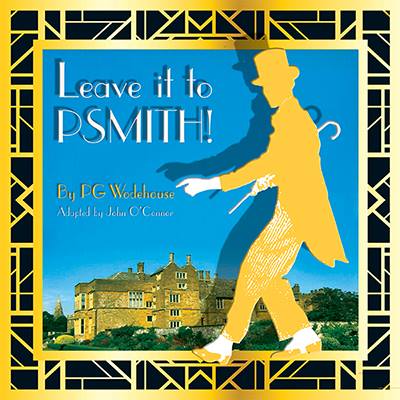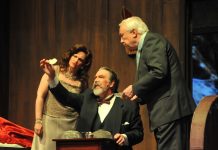Clomping into the Silver Spring Black Box Theatre, shivering from Snowzilla’s persistent chill and shaking caked snow and ice from our boots, we are greeted by the pleasant, ear-warming sounds of melodies from the English music hall by Sound Engineer: Ron Murphy, and the welcoming sight, at stage right, of delicate, pastel furnishings: a French Provincial dining room chair upholstered in cream-colored fabric before a broad arch-shaped white door, half-open as if to invite our gaze into the lighted room within by Lighting Designer Eve Vawter.
https://youtu.be/0r_08STTxXQ
To its left are several small flower pots; to the right of the chair, two more. On the chair stands a book, “Melancholy,” above it, a large painting framed in lighter wood depicts a bridge over water, flanked by trees and cottages on either bank. (Props: Jeff Streuwing; Set Design: John O’Connor; Set construction: Jim Porter, Chris Brown, Steve Brown; Scenic painting: Celeste Wiser.) At stage left, we see a tall, two-storey rectangular building labeled “THE SENIOR CONSERVATIVE CLUB.”
Between the two sets, towards the back, is a cement balustrade peeking out from behind two huge flower pots, evoking perhaps the “gardens of Blandings Castle,” where the play is set—according to Evelyn Waugh, “that original garden from which we are all exiled.” (Set Design by John O’Connor; set construction by Jim Porter, with Chris Porter and Steve Brown.) In this adaptation of P. G. Wodehouse’s 1930 play by John O’Connor, flower pots will play a key role—but in circumstances that are as far from the idyll of Eden as a determined arm can hurl or hide them. And yet . . .
Enter Lord Emsworth, master of Blandings (but of little else), a gentleman for whom the word “befuddled” must have been invented—and a role mastered, with a sympthetic-chuckle-inducing sweetness, by the selfsame John O’Connor. Dressed appropriately in shades of beige, his vest buttoned with the best intentions, Lord Emsworth is treated with outwardly respectful forbearance by his loyal secretary, Baxter, played to a high “T” by Artistic and executive director David Minton, who perfectly encapsulates the spirit, speech, and kinetic stiff-upper-everything of the great British butlers of Golden Age films. (Taking a tip—and for them at times, a tipple—from the Chaplin and Keaton playbook, in one memorable scene, O’Connor’s oblivious Elmsworth, in the top floor of the clubhouse, hit in the head with a flowerpot that finally finds its mark, stumbles, sways, swirls and, at last—we can almost hear the descending cartoon whistle—drops. Bravos all round for the choreography as well as the acting, not only to O’Connor and Minton, et al., but to Stage manager Ben Lickerman.)
Emsworth’s sister, the imperious Lady Constance (Wendy Lanxner, as utterly, and indifferently unsympathetic as she should be), is less inclined, and even less willing, to grant her brother any leeway. Or her husband, Joe Keeble, any money, which he wants for an unquestionably valid reason: to give to his loved (and lovely) stepdaughter, Phyllis. Making the ensuing theft of her diamond necklace, a plot hatched by her husband and Emsworth’s ne’er-do-well son Freddie (Keith Anderson), seem—at least to them—less crime than punishment.
As Joe, Andy Penn (guided, no doubt, by John O’Connor’s adaptation, and Kelly Newman O’Connor, John O’Connor, and David Minton’s able direction), in a tan, unbuttoned suit, its belt hanging behind him, is more aspiring (or failed) Mafioso than everyday Joe. Cast in the Jimmy Cagney wannabe mold, Penn’s diminutive, quick-on-the-trigger but ultimately, humorously hapless hubby is a sympathetic-pathetic amalgam still fleetingly capable, however, of real flair with a firearm.
Freddie, meanwhile, is a practical sort whose laziness may be more boon than bane when he needs something done. Having run out of funds to finance his profligate ways, and having been told by Uncle Joe of his like lack thereof when he asks him for 3,000 quid, the two moneyless men decide to filch Aunt Connie’s necklace and split the proceeds. Such delicate work being beyond the skill-set of such high-born gentlemen, enter: Beach the butler (Stewart Hickman, hilariously hooded-eyed and dry as dust), who opens the paper and sees an ad (cleverly couched in 21st-century form and idiom) placed by a Psmith, who will do anything for the right price.
Phyllis (Binta Coulibaly, in a cream chiffon cocktail dress with knife-pleated skirt) meets up with a former teacher and a friend from her school days, Ada and Eve (what was that you said, Mr. Waugh?) who pity the newly penurious Phyllis. Cassie Gabriel’s Ada, in businesslike taupe and very high heels, and Dre Weeks’s Eve, in brown and blue, a giant feather shooting from her hat, give just the right mix of sugar and spite to their roles, while Coulibaly’s Phyllis is charming and generous, her smile genuine, refusing to respond to their subtle scorn.
Her open-heartedness finds its mate in that of the disarming Ronald Psmith (“the ‘P’ is silent,” he assures one and all, while joking to Freddie, who has come to give him the once-over, “These trousers may fit well”—suggesting wealth—“but it is only because the pockets are empty”); but it is not she for whom he will fall head-over-heels.
At the Senior Conservative Club, the distracted Lord Emsworth is making little headway in his attempt to recruit poet Ralston McTodd (Ben Lickerman), restless and disagreeable, who leaves in exasperation after Emsworth suddenly decides to explore the flowers across the street. By serendipitous chance, taking his place at the table is Psmith. Happily believing his dining partner still to be McTodd, Lord Emsworth reiterates his invitation. Upon seeing Emsworth meeting with Eve, who has caught his attention in two prior meetings, Ronald realizes it might not be a bad idea to go along with the elderly gent’s delusion—and, in so doing, earn a few quid by helping Freddie out with his scheme.
Ah, but there are real crooks who would like to get their paws on those precious jewels: ex-card sharp Ed Cootes (Ritchie Porter) and his long-ago ex-girlfriend Smooth Lizzie, now morphed into the mawkish (but—as portrayed by co-director Kelly Newman O’Connor with a simple, human sincerity—graceful, kind, and humorous) American poetess Aileen Peavey, who reunite when Cootes susses out a chance to cash in on Ralston McTodd’s absence. Porter’s Cootes is superb, his dignified pose and Oz-like vocal projection as the Great Poet diminishing into a middle-school, “Let’s put on a show!”-like Donald O’Connor as he begins to doubt himself, then swerving to pick up the Cagney gene as he sneeringly vows to unmask McTodd.
And the plot—like English pea soup—thickens.
Impersonations and mistaken identity are the order of the day, as is improbable but satisfyingly successful doubling. (Ben Lickerman not only carries off the superficial McTodd, but aces Angus McAllister, the ox-like, highly opinionated head gardener.) Even the maid is a licensed spy, with the magnetic Liz Porter in an all-too-brief appearance, your eyes locked on her lightning-fast switch from demure duster-wielder to death-defying (and deadly) detective-in-disguise, her eyes narrowing and visibly darkening, her voice leaping from kitten-like mew to furious Shepherd bark.
The other characters (having noted just a few of the nearly forty) are equally well-cast, and well-realized. Sir Gregory Parsloe-Parsloe—in this production, Parsloe Devine—Lord Emsworth’s envious neighbor, has an outsized appreciation for his surname’s homonyn. Smiling smugly as he strokes his Snidely Whiplash mustache, Mark Reiner exudes a Trump-like self-regard.
Recalling Agatha Christie (the two writers were mutual fans), in a seemingly fortuitous suspect-gathering, the long-awaited poetry reading opens Act II, introducing yet another larger-than-life character (in both senses), and additional examples of elegant evening wear, both men’s and women’s. As Vladimir Brusiloff, Brian Monsell gives us a huge, roaring Russian bear of a man, nattily attired in dark blue suit, white shirt, broad red tie and dark beret and sporting a Dostyevskian salt-and-pepper beard and mustache. As the author would write, with quintessential Wodehousian drollery, the dystopian Russian novelist “specialized in gray studies of hopeless misery, where nothing happened till page three hundred and eighty, when the moujik decided to commit suicide.”
No danger of that here. “Mr Wodehouse’s idyllic world can never stale,” wrote Evelyn Waugh in words that ring as true today as they did half a century ago. “He has made a world for us to live in and delight in.”

Leave it to PSmith! played through January 30, 2016 at Lumina Studio Theatre – 620 Pershing Drive, in Silver Spring, MD. For information about upcoming events go to Lumina Studio Theatre.
RATING:






Fabulous synopsis and marvelous review Leslie!! You are a critic such as all directors and actors (and stage crew!) dream of. Audiences too! Such a great read. A thousand thanks! Can’t wait to share with the cast, family and friends. P.S. Thanks also to you and Joel for including Luc Daniel’s trailer. He is one of Kelly O’Connor’s students at Montgomery Blair High School — a man of many talents.
Such a deliciously entertaining performance!! We were fortunate to be able to get tickets for Saturday evening’s sold-out show. Smart dialogue and laugh out loud funny.
Sorry I missed it!
No wonder it was sold out both evenings. So sorry I missed it. Sounds like the right sort of medicine in response to the snow!